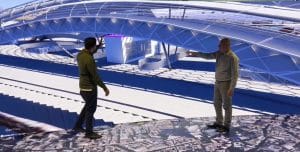Automakers these days are either acquiring or investing into LiDAR companies for their connected and AV projects. LiDAR sensors are crucial for safe mobility and detecting obstructions on the road. Recently, Volkswagen’s CARIAD acquired LiDAR maker Innoviz for $6.6 billion.
“We are thrilled to work with the CARIAD team and be a supplier of LiDAR sensors and perception software to support safe mobility for vehicles launching from the middle of the decade,” says Innoviz CEO and Co-Founder, Omer Keilaf.
Volkswagen has also partnered with Intel subsidiary Mobileye for its LiDAR technology.
Argo AI, a self-driving vehicle start-up acquired LiDAR company Princeton Lightwaves and unveiled a long-range LiDAR sensor in the middle of 2021 and claims that it has the ability to see 400 meters away with high-resolution photorealistic quality and has the ability to detect dark and distant objects with low reflectivity. These LiDAR are already in use on some of Argo’s test vehicles, which comprise of Ford Fusion Hybrid sedans and Ford Escape Hybrid SUVs. That’s not all, Argo plans to increase the number of vehicles to another 150 Ford Escape Hybrid vehicles, in which Argo’s in-house LiDAR sensor will be used.
Ford has invested $1 billion into Argo and plans to deploy AVs for ride hailing and delivery this year. Besides Volkswagen, which is Argo’s another investor as well as customer said that it will start its commercial operations in 2025.
ALSO READ: Our Goal is to Make LiDAR Ubiquitous: Dr. Ted Tewksbury
It’s not just the technical capabilities of the LiDAR sensor that matter. The LiDAR sensor was developed to be cost-effective and manufactured at scale, two factors that matter for any company trying to commercialize AV technology,” Argo CEO and CO-founder Bryan Salesky was quoted as saying to TechCrunch.
For now Argo’s LiDAR sensors are applied in robotaxis and middle-mile delivery and Salesky hinted that it could be applied to trucking.
Hyundai Motors revealed that it’s planning to acquire a South Korea-based LiDAR-free autonomous mobility platform 42dot, in an effort to strengthen its autonomous driving technology.
According to 42dot’s regulatory filing, Hyundai owns a 20.4% stake in 42dot and interestingly 42dot’s co-founder and CEO Chang-Hyeon Song, who is also the General Manager of Hyundai Motor Group’s transportation-as-a-service (TaaS) headquarters’ in charge of mobility; he held a 36.19% stake and the remaining shareholders are domestic companies such as Lotte Rental, Shinhan Financial Group, Stick Ventures, and We Ventures and venture capital (VC), as of December 2021.
Hyundai plans to make an investment of at least $306.4 million in 42dot, as reported by South Korean media.
Mercedes-Benz also partnered with Luminar, a laser LiDAR start-up and acquired 1.5 million Luminar’s shares as part of the partnership. Luminar will supply sensors for Mercedes’ luxury vehicles and gathering on-road data for them to improve automated driving.
Valeo‘s second generation LiDAR, Valeo SCALA 2 is used in the Mercedes-Benz DRIVE PILOT system for conditionally automated driving (SAE-Level 3).
“This partnership demonstrates how substantially increased safety and autonomous driving functions on consumer vehicles are going from sci-fi to mainstream,” said Austin Russell, Founder and CEO, Luminar. “Mercedes-Benz has always been a technological leader and first mover for the industry, with the brand synonymous with automotive innovation, safety, luxury, and quality.”
ALSO READ: Enhancing LiDAR Performance for Better Data Collection
Some automakers beg to differ!
Tesla and Toyota are preferring HD Cameras/ neural networks etc. over LiDAR. Toyota is working to develop AV technology by employing low-cost cameras, which costs 90% less than sensors. They believe using LiDAR technology is costly and not scalable enough in testing of the AVs.
In a Reddit conversation around electrification, autonomy, new automotive technology etc., Volkswagen CEO Herbert Diess expressed that LiDAR technology is essential to achieve the Level 3 autonomous driving system, pointing directly at Elon Musk, CEO, Tesla, who has different opinion when it comes to application of LiDAR technology in cars. Musk had earlier said that “LiDAR is expensive, ugly and unnecessary, and LiDAR cannot recognise road signs”, which is why Tesla cars rely more on cameras.
“We need a lot of data. And it’s not sufficient to just have a small amount of data that can be collected from a small fleet of very expensive autonomous vehicles. Rather, we’re trying to demonstrate that we can unlock the advantage that Toyota and a large automaker would have, which is a large corpus of data, but with a much lower fidelity,” Woven Planet Vice President of engineering Michael Benisch told the news wire.
However, Benisch also said that Toyota will continue to use sensors for LiDAR and radar for robotaxis and other AVs that will be deployed on roads because LiDAR remain the best and safest approach for the development of robotaxis.









